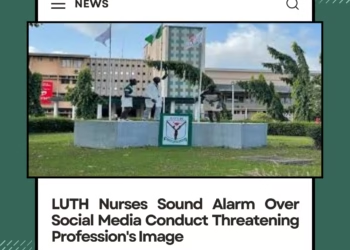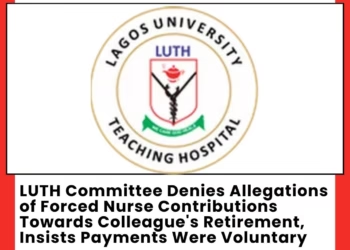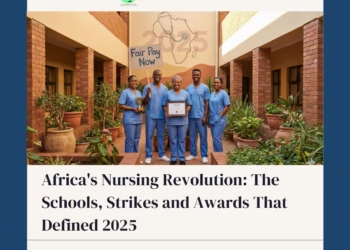GOOD INTERPROFESSIONAL RELATIONSHIP: A KEY TO RESOLVING THE CURRENT HEALTH SECTOR TUSSLE.
The healthcare sector globally could be likened to a game of football with each player working towards achieving a particular aim of scoring a goal and winning the game. Every player is important from the goal keeper to the defenders, to the midfielders and to the strikers.
The role of each player cannot be perfectly performed by another. For instance, it is going to be a disaster to say a striker should replace a goal keeper or a midfielder to replace the defender, not because all are not players but the role of each is different. Though they train together but the training is difference and the usefulness is different.
Interestingly they don’t earn the same way but there’s EQUITY. Every player has the same right and earn according to his productivity and above all, there’s harmony in the system because everyone is happy.
Coming back to the Nigerian healthcare sector what is obtainable is a case of “The slavemaster and the slave”. Some group of people with low productivity compared to others in the system has decided to enslave others by virtue of their positions and political influence.
The cause of this incessant industrial actions with resultant catastrophic effect on the Nigeria health sector.
The parlous state of inter-professional relationships in the sector has also encouraged the growth of a most undesirable culture of “territorialism” which has caused the decline of true, professionalism among practitioners. Each professional group converts its professional roles and even physical operating space into a “territory” that must be “guarded jealously” against any “violation” by any perceived competitor(s).
Sadly, this odious culture of “Territorialism” is being passed to junior/up-coming practitioners. Strained inter-professional relationships have also led to the creation of complex, unwieldy organizational structures within each profession that only serves to nourish egos and reduce productivity. It has also contributed to the poor image of the public health sector among our fellow citizens and is a festering problem that requires urgent intervention.
In the Medical school for example, medical students were taught as “The Team leaders/ captain of the team” even when they are still in training and come to the ward, it is already instilled in them as the leaders and every other persons within the health care sector is infinitesimal. The reason you will see a medical officer come into the ward and the next thing you hear is ” Matron get me the patient’s folder please”! as if he’s the one that employed the matron or paying her salary.
Forgetting that the matron chose to be a nurse the same way they chose to be doctors.
I was at the almighty UCH, Ibadan some weeks back and I can perceive the effectiveness of the strike as the whole hospital complex was thrown into the darkness. No activity seems to be going on, not even the medical services. I was forced to ask if doctors were on strike too.
Remember, barely a month ago, a Patient was said to have committed suicide out of frustration by jumping from the three storey building in this same hospital, what were these doctors doing when this incident happened?
I thought they said they are the alpha and omega in the hospital and every other person is “Just a support staff” it is obvious now that without Nurses, laboratory scientists, pharmacists, physiotherapist, and even cleaners, the doctors are totally useless and the earlier they realise this the better for them.
The World Health Organisation (WHO) in 2010 defined inter-professional collaboration as a situation where: “Multiple health workers from different professional backgrounds work together with patients, families, caregivers, and communities to deliver the highest quality of care”. This is essentially a situation where Health care professionals assume complementary roles and cooperatively working together, sharing responsibility for problem solving and making decisions to formulate and carry out plans for patient care.”
The key word here is “together”. This model was also suggested by the Institute of Medicine (IOM) the American health policy think-tank as a veritable tool for improving multi-disciplinary care of patients. Critical components that make up this concept must however be put in place for it to succeed. These include: Clear role definition/role clarification of professionals in the health team. There should be clear, unambiguous guidelines stipulating the roles, responsibilities and limits of all the different professionals in the sector. This surely has always existed in some form, but the lines of responsibility have been blurred in recent agitations. The Federal Ministry of Health has a role to play in this regard.
There is considerable evidence that inter-professional team work enhances communication, reduces errors, and improves patient outcome and satisfaction as well as staff satisfaction. These outcomes also lead to enhanced patient/client self-care, knowledge and outcomes, provider satisfaction, skills and practice behaviours.
It stands to reason that as in many other sectors of the economy, the health care sector is also not immune to class struggle which has pitched the doctors against other professional groups in the hospital. The struggle for class distinction and leadership tussle by doctors has created acrimony among other professional which has not augured well for the overall effective discharge of their duties.
In finding solutions to this challenge however, may involve a multi-dimensional approach. Government at all levels must put in place policies that recognises the different roles of health professionals but at the same time encourage inter professional working relationship. Most importantly, all stakeholders must be well remunerated.
Building effective healthcare systems does not depend on technical factors or infrastructural adequacy alone. Human factors are extremely important. We must advocate for inter-professional collaboration amongst ourselves because collaboration “divides the task and multiplies the success”.
The timeless words of Mattie J.T. Stepanek may be very useful at this juncture: “Unity is strength. When there is Team work and collaboration wonderful things can be achieved”. There can never be unity within the healthcare system unless there is EQUITY AND NOT EQUALITY BECAUSE AN HUNGARY MAN IS AN ANGRY MAN.
OLUWATOSIN K. Odunayo.
Editor-in-chief / CEO,
Fellow Nurses Africa.
Copyright © 2018 | Fellow Nurses Africa | All Rights Reserved










